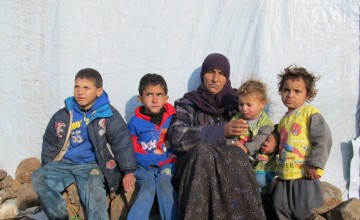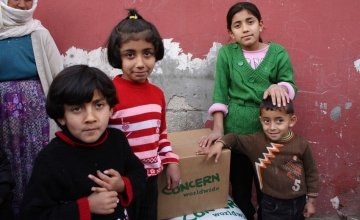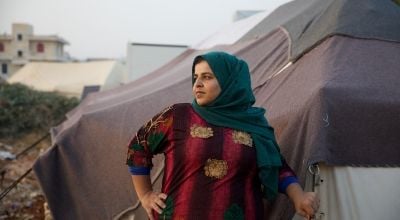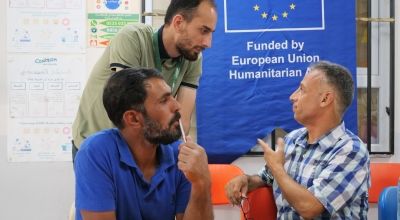
Read our 2022 annual report

Knowledge Hub
EU-Turkey deal won’t address root causes of the refugee crisis

The recent EU deal with Turkey regarding Syrian migrants has been met with considerable backlash from aid agencies working with refugees on the Greek islands. Many aid agencies have argued that the deal is unethical, illegal and impractical.
Aid agency boycott
The UN Refugee Agency (UNHCR) was the first major agency to show its resistance. It suspended a number of its activities on the Greek Islands arguing that refugee processing centres have now effectively become areas of detention for refugees awaiting repatriation to Turkey.
Medicines San Frontiers (MSF), the International Rescue Committee (IRC) and the Norwegian Refugee Council quickly followed with announcements that they too were to boycott the detention centres. They argued that cooperating with the Greek authorities at these centres would make them complicit to a practice that was unfair and inhumane.
At the core of the agreement, which came into force last week, is the supposed “one-for-one” proposal. Under this arrangement, refugees who arrive by sea to Greece will be sent back to Turkey unless they apply – and are accepted – for asylum. For every one Syrian refugee that is returned to Turkey, another will be resettled within the EU from a refugee camp in Turkey.
A huge burden
Political considerations aside, it must be noted that Turkey has largely led the way in terms of hosting refugees following the Syrian crisis. More than half of the 4.8 million Syrian refugees that are registered are hosted in Turkey. Furthermore, Turkey has legally afforded refugees the right to work and access public healthcare. This is a real milestone, a crucial support for refugees that will allow them to make a valuable contribution to Turkish society and the economy.
It should also be remembered that, along with Turkey, it is the countries in the region around Syria that are hosting the vast majority of refugees – countries with much fewer resources and capacity to respond to than crisis than Europe.
Conflict causes crisis
On the surface, the deal makes some sense. It is an attempt to get to grips with the chaotic migration across the Aegean Sea and although the primary motivation for the deal is to stem the flow of people entering Europe, there is also a humanitarian consideration: to reduce the tragically high number of people drowning while trying to reach Europe.
Much will depend on the mechanism of the deal’s operation and how it’s applied in practice. However, one thing is certain: though it may affect the current channel through which Syrian refugees come to Europe, it won’t have a significant impact on the conflict itself, on the suffering that the conflict is causing, or on the numbers of people fleeing that conflict.
Prioritise the root causes
This is perhaps the more worrying aspect of the deal. Aside from legal and ethical considerations, it is a stark example of how EU leaders consistently fail to prioritise the root cause of the mass migration in the region: the Syrian conflict. Concern's primary message, and that of other aid agencies working in the region, has always been that a political solution to the crisis is the only possible way to bring peace to Syria and reduce the flow of refugees into Europe.
At best, this deal is an avoidance strategy – a myopic solution to a symptom of a problem, rather than an attempt to try to solve the problem itself. At worst, it is a continuation of Europe dragging its heels during the greatest refugee crisis since the Second World War, and may force migrants into even more perilous routes when fleeing the conflict. The broader impact of this strategy may be that it sends a signal to host countries outside of Europe that avoiding responsibility for the refugee crisis is now acceptable.

Naïve assumption
I visited the Concern programme in Turkey last week, where our team is supporting refugees who have fled the conflict in Syria. What struck me was that they had neither the means nor the desire to go to Europe. They simply longed to go back home to a peaceful Syria.
In any refugee crisis, conflict, violence and security issues are overwhelmingly the most common causes of people fleeing their homes. A cessation of violence and the restoration of security is the only thing that will enable them to return home. The desperation that forces people to pay their life savings to smugglers to make such a perilous journey as the one from Turkey to Greece is an indication of just how horrific this conflict is.
It is utterly naïve to think that a change in policy such as this deal will have a sizeable effect on the number of refugees trying to reach Europe. Only events within Syria will have an effect on that.
Refocus on peace talks
As European leaders deliberate short-term solutions to the refugee crisis within Europe, it is incumbent upon aid agencies to force the spotlight back on Syria itself. This is where the problem lies. This is the source of the refugee crisis.
If EU leaders are serious about attempting to deal with the crisis, they must turn their heads from Ankara to Geneva, to a refocus on peace talks. The situation in Syria is indisputably catastrophic but the current cessation of hostilities has resulted in a dramatic decrease in bloodshed and created some momentum for dialogue that should be seized upon.
Leadership, patience, bravery
Prospects for peace remain elusive but if there is a temptation to be fatalistic about the conflict in Syria, we must remind ourselves of our own experience in Northern Ireland. When conflicts of this nature are at their nadir, there seems to be no end in sight but Northern Ireland has shown that, while peace negotiations are painstakingly difficult, it is never naïve to set our eyes toward the horizon of peace, however distant it may appear.
We have no right to not act. We have no right to not hope. We have no right to shut our doors and give up on the Syrian people.
Peace was achieved in Northern Ireland through a range of actions, but primarily because of leadership – leadership, patience and bravery to take the tough decisions when necessary. By fixating on the refugee crisis in Europe, European leaders do little to stop the conflict and people fleeing it.
It is time for Europe to take a leading role in dealing with this conflict, not simply the human fallout of it.
Find out more
Follow the link below to find out more about Concern's response to the crisis in Syria, Turkey and Lebanon.





